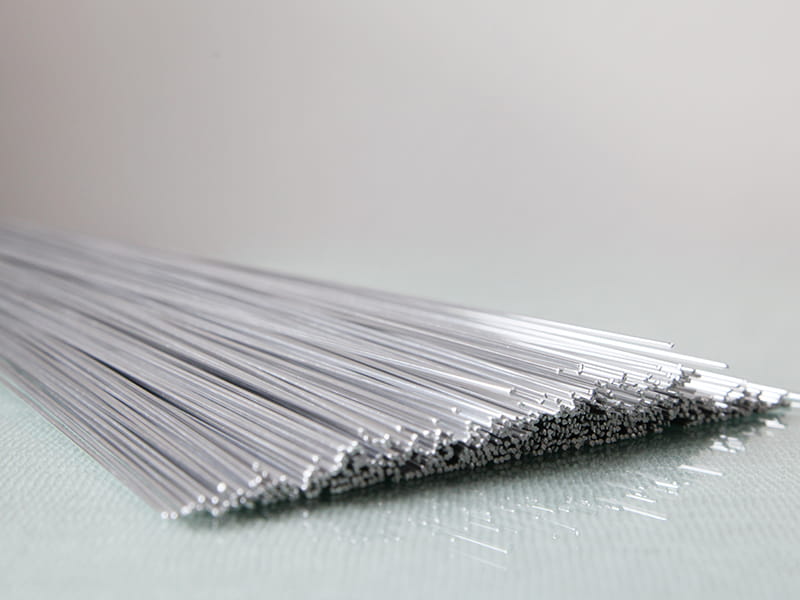How is aluminum welding wire different from other types of welding wire?
Aluminum welding wire is a popular choice for welding aluminum materials due to its unique characteristics and properties. Unlike other types of welding wire, aluminum welding wire is specifically designed to meet the needs of welding aluminum materials, which require a different approach than other types of metals. In this essay, we will explore the key differences between aluminum welding wire and other types of welding wire.
One of the primary differences between aluminum welding wire and other types of welding wire is its composition. Aluminum welding wire is typically made from pure aluminum or an aluminum alloy that contains other metals such as magnesium or silicon. This composition is specifically designed to match the properties of aluminum materials, including their high thermal conductivity and low melting point. Other types of welding wire, such as those used for steel or copper, may be made from different materials such as stainless steel, mild steel, or nickel alloys.
Another key difference between aluminum welding wire and other types of welding wire is its diameter. Aluminum welding wire is typically much thinner than other types of welding wire, with diameters ranging from 0.023 to 0.062 inches. This thin diameter is necessary to ensure proper penetration and fusion when welding aluminum materials, which can be more difficult to weld than other metals due to their high thermal conductivity and low melting point. Thicker welding wire used for other metals would simply burn through the aluminum before proper penetration and fusion could be achieved.
Aluminum welding wire also requires a different type of shielding gas than other types of welding wire. Because aluminum is highly reactive with oxygen, it must be welded in an environment that is free from oxygen and other contaminants. This is achieved by using a shielding gas such as argon, which displaces the air around the weld and prevents the aluminum from oxidizing. Other types of welding wire may require different types of shielding gas depending on the metal being welded and the specific welding process being used.

One of the primary differences between aluminum welding wire and other types of welding wire is its composition. Aluminum welding wire is typically made from pure aluminum or an aluminum alloy that contains other metals such as magnesium or silicon. This composition is specifically designed to match the properties of aluminum materials, including their high thermal conductivity and low melting point. Other types of welding wire, such as those used for steel or copper, may be made from different materials such as stainless steel, mild steel, or nickel alloys.
Another key difference between aluminum welding wire and other types of welding wire is its diameter. Aluminum welding wire is typically much thinner than other types of welding wire, with diameters ranging from 0.023 to 0.062 inches. This thin diameter is necessary to ensure proper penetration and fusion when welding aluminum materials, which can be more difficult to weld than other metals due to their high thermal conductivity and low melting point. Thicker welding wire used for other metals would simply burn through the aluminum before proper penetration and fusion could be achieved.
Aluminum welding wire also requires a different type of shielding gas than other types of welding wire. Because aluminum is highly reactive with oxygen, it must be welded in an environment that is free from oxygen and other contaminants. This is achieved by using a shielding gas such as argon, which displaces the air around the weld and prevents the aluminum from oxidizing. Other types of welding wire may require different types of shielding gas depending on the metal being welded and the specific welding process being used.

PREV:Aluminum alloy wire has become a popular choice for many industries due to its unique properties and versatility
NEXT:What are the key trends and challenges facing the aluminum welding wire industry, and how are manufacturers responding to them?
NEXT:What are the key trends and challenges facing the aluminum welding wire industry, and how are manufacturers responding to them?
Related Products
-
 View More
View More
5154 Aluminum Alloy Welding Wire
-
 View More
View More
ER4043 Silicon Aluminum Welding Wire
-
 View More
View More
ER4047 Aluminum Mig Welding Wire
-
 View More
View More
ER5154 Al-Mg Alloy Wire
-
 View More
View More
ER5087 Magnesium Aluminum Welding Wire
-
 View More
View More
Aluminum Welding Wire ER5183
-
 View More
View More
ER5356 Aluminum Welding Wire
-
 View More
View More
ER5554 Aluminum Welding Wire
-
 View More
View More
ER5556 Aluminum Welding Wire
-
 View More
View More
ER1100 Aluminum Welding Wire
-
 View More
View More
ER5754 Aluminum Welding Wire
-
 View More
View More
ER2319 Aluminum Welding Wire
 English
English Deutsch
Deutsch
 English
English Deutsch
Deutsch

